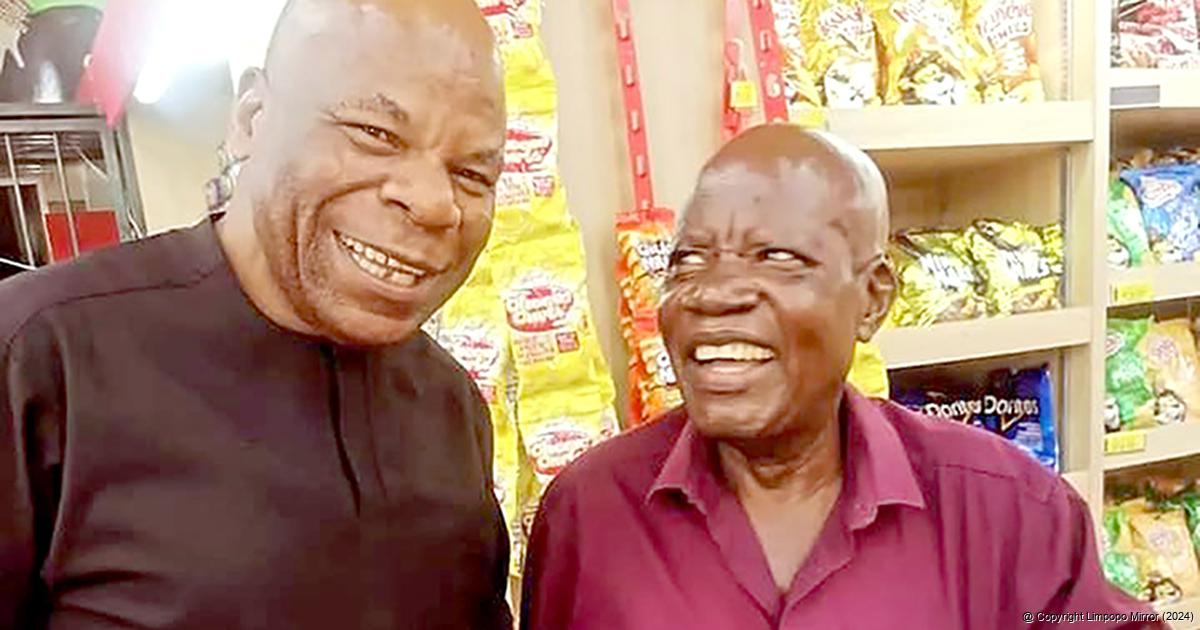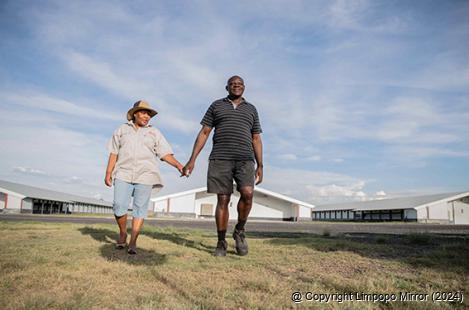

ADVERTISEMENT:

Two legends of the airwaves, Fhumulani Kenneth Mathivha and Russell “Tshiendangolo” Mashige. Photo: Victor Mukwevho.
Local media legend Kenny Mathivha reflects on the past
One of the most renowned journalists in the country, Fhumulani Kenneth Mathivha, influenced many youths to utilise the mighty power of the pen to participate in the emancipation of the masses from the dreadful apartheid government.
In the late 1980s and the early 1990s, aspiring up-and-coming journalists spent hours listening to the then-young Mathivha on Radio Thohoyandou, well-known as The Big T, interviewing politicians from different spheres of life, thereby shaping them in the world of journalism. Many local journalists in the industry today joined the not-so-well-paying profession through his impeccable influence.
Securing an interview with such a colossal figure in the media industry is no easy feat, but after months of persistent attempts, Mathivha agreed to share his journalistic journey with the rest of the country.
Mathivha’s interest in journalism began when he was a student at Mphaphuli High School in around 1977. “Most of my friends were being detained left, right, and centre by the Bantustan government of Patric Mphephu. There were rumours that Venda was going to be a republic. The only medium of information was radio, but I was interested in writing,” he said.
In 1989, he joined Radio Thohoyandou under the tutelage of the now Bishop Sakie Dagada, who was the station manager. “There we had DJs like Loyd Nedohe, Lionel Myles, Lufu Mphaga, Jimmy ‘The scratcher’ Netshilulu, Sydney Baloyi, Razzmatazz Mashige, and many others. I was a news reporter. I would go out, gather news, and compile it for news readers. Later, I introduced the current-affairs programme ‘Ngei na Ngei,’” he said.
After the unbanning of political parties and the release of Nelson Mandela and political prisoners, he was offered a scholarship by the Desmond Tutu Foundation and the Institute of International Education (IIE) to study Broadcast Journalism at Jackson State University, USA, in 1991.
“While in the US, I used to send stories to the Limpopo Mirror newspaper, which was being edited by a friend, the late Mr. Wikus Lee. When I came back in 1993, I started reporting and sending stories to BBC World Service in London. South Africa was under siege. Unrest, killings, and protests were the order of the day,” he said.
He added that he had later joined the BBC World Service in London. Mathivha further described how, in 1995, the new SABC CEO Zwelakhe Sisulu came to London and specifically handpicked a few of them to bolster the new SABC's political desk based in Cape Town.
“I joined the team in 1995 under Pippa Green, now a professor at UCT. I covered events and travelled with President Mandela around the world. During this period, I witnessed the IFP fights in Ulundi and gangwars on the Cape Flats,” he said.
In 1997, Mathivha left journalism and joined the first Premier of the then Northern Transvaal, Advocate Ngoako Ramatlhodi, as his second spokesperson after Jack Mokobi. “From then on, I became spokesperson for several departments, until I retired in 2023,” he concluded.
Date:11 May 2024
By: Victor Mukwevho
Victor Mukwevho Ne-vumbani joined the Mirror during it's inception in 1990. He joined the SABC newsroom in 1995, and was known by listeners as "A u fhedzisela ari". He was a news editor for The Tembisan Newspaper from 2007 to 2015. He rejoined the Limpopo Mirror newspaper in June 2022 as a freelance journalist.
Read: 2561

ADVERTISEMENT

ADVERTISEMENT:

Sponsored Content
McDonald’s yo rwela ṱari fulo ḽa ‘Know Our Food’
Vha McDonald’s fhano Afrika Tshipembe vho rwela ṱari fulo ḽavho ḽine ndi ḽau ḓivhadza vharengi vhavho nga ha vhuleme ha zwiḽiwa zwavho, nau ombedzela ha khamphani nga ha nḓila dzine vha dzudzanya ngayo zwiḽiwa zwavho vhatshiela vharengi.

ADVERTISEMENT:

Recent Articles
-

-

Damani Water Project upgraded and handed back to waterless residents
27 July 2024 By Silas Nduvheni -

Vhafaramikovhe vhatuku vhari vha ṱoḓa masheleni murahu nau vulwa ha VBS.
26 July 2024 By Elmon Tshikhudo -

Nga murahu ha minwaha ya sumbe, muḽoro wa Vendaboy Poet wo wedza.
26 July 2024 By Elmon Tshikhudo -

Vho Makhadi vho khethwa sa muthusamudzulatshidulo wa Sanef
26 July 2024 By Victor Mukwevho

ADVERTISEMENT

Popular Articles
-

Where do Limpopo's residents move to?
16 June 2024 By Anton van Zyl -

'Vampire' who attacks old lady killed by angry mob
07 June 2024 By Maanda Bele -

Univen student to represent SA in Germany
22 June 2024 By Thembi Siaga -

Light aircraft crashes at Masakona village
13 June 2024 By Thembi Siaga -

Dr Tryphina explores how indigenous plants can help cure “u wela”.
15 June 2024 By Maanda Bele -

When men are together, great ideas emerge
08 June 2024 By Elmon Tshikhudo -

No, the “foreigners” are not suffocating us in Vhembe.
16 June 2024 By Anton van Zyl


